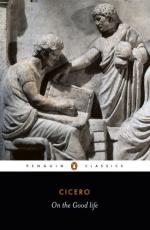
|
| Name: _________________________ | Period: ___________________ |
This test consists of 15 multiple choice questions and 5 short answer questions.
Multiple Choice Questions
1. According to the introduction, what protestant thinkers was Cicero popular among?
(a) Melancthon.
(b) Luther and Melancthon.
(c) Luther.
(d) Pope Gregory.
2. What does happiness necessarily require, according to Cicero?
(a) Laughter.
(b) Singing.
(c) Tranquility.
(d) Smiles.
3. According to Cicero, how does he view tyrannies?
(a) Needed.
(b) Unnecessary.
(c) Stable.
(d) Unstable.
4. What are external 'bads' considered to be, according to Cicero?
(a) Preferables.
(b) Unpreferables.
(c) Indifferents.
(d) Necessary to happiness.
5. In "On Duties," how many feelings does Cicero say a good ruler should inspire in his subjects?
(a) 3.
(b) 1.
(c) 2.
(d) 5.
6. What type of interest did the Romans have towards philosophy, according to Grant?
(a) Superficial.
(b) Slight intrigue.
(c) Deep intrigue.
(d) Deep and thoughtful.
7. Where is the setting of "Discussions at Tusculum"?
(a) Cicero's apartment.
(b) Cicero's country villa.
(c) Cicero's friends house.
(d) By a river.
8. What does the Greek philosophy believe about the good life, according to "Discussions at Tusculum"?
(a) The good life is a rich life.
(b) The good life is a happy life.
(c) The good life is expensive.
(d) The good life means to have friends.
9. Who is the discussion between, in "Discussions at Tusculum"?
(a) Cicero and a friend.
(b) Cicero and Dante.
(c) Cicero and his dad.
(d) Cicero and Caesar.
10. What does Grant state Cicero was excellent at doing?
(a) Challenging ideas.
(b) Popularizing ideas.
(c) Deepening ideas.
(d) Manifesting ideas.
11. What happens once virtue is acquired, according to Cicero?
(a) It makes a person good, thus making him happy.
(b) It can not be lost except by free choice.
(c) It is temporary.
(d) It is permanent.
12. What did Cicero argue is the cure for misfortune?
(a) Frienship.
(b) Psychology.
(c) Love.
(d) Philosophy.
13. What did an ancient ethical view believe was necessary for happiness?
(a) Stability.
(b) Being positive.
(c) Being true to oneself.
(d) Friends.
14. What does Cicero question about virtues in "Discussions at Tusculum"?
(a) Whether they can make for a supremely happy life.
(b) If they are a tangible or intangible component.
(c) If they are necessary to people.
(d) Whether or not they even exist.
15. What did Cicero believe humans cannot find peace without?
(a) Fighting for your thoughts.
(b) Falling in love.
(c) Serving mankind.
(d) Thoughts and rations.
Short Answer Questions
1. When did Cicero's reputation decline, according to the introduction?
2. What are external goods always at risk of, according to Cicero?
3. According to Cicero, in "On Duties," which of the following will NOT inspire a good ruler's subjects?
4. In "On Duties," which book is only reproduced in this particular selection of readings?
5. What are the series of arguments about in "On Duties"?
|
This section contains 430 words (approx. 2 pages at 300 words per page) |

|




